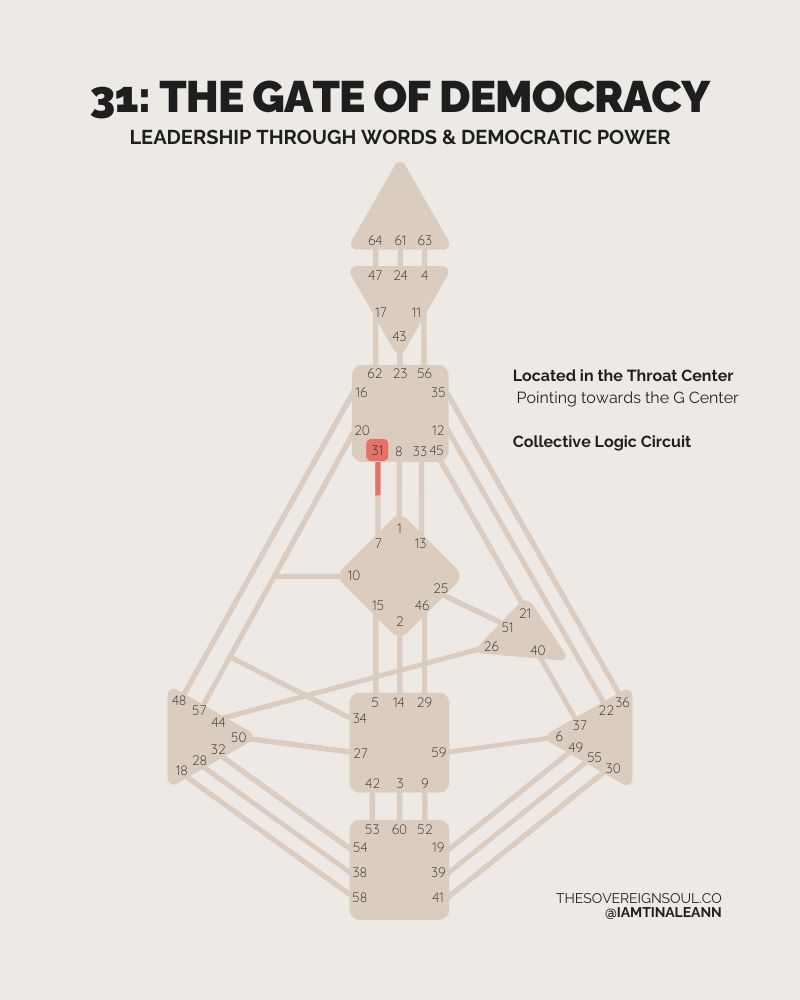Gate 31 in Human Design: The Gate of Influence – Leadership Through Words & Democratic Power
Do people naturally listen to what you have to say? Do you feel called to lead and influence others through your voice and ideas? Have you ever struggled with balancing your desire to lead with your need to serve the collective?
If so, you might be experiencing the energy of Gate 31 – The Gate of Influence in Human Design.
This gate is all about leadership through communication, democratic influence, and guiding the collective with vision. People with Gate 31 are natural influencers—not because they seek power, but because their words carry weight and inspire change. However, their challenge is leading with integrity and ensuring they serve the needs of others rather than seeking authority for personal validation.
Gate 31 is located in the Throat Center, which governs communication, self-expression, and the ability to influence others.
This gate is part of the 7-31 Channel (The Channel of the Alpha) when connected to Gate 7 (The Gate of the Role of the Self in Interaction) in the G Center. Together, these gates create a powerful leadership dynamic, where vision (Gate 7) is translated into influence and communication (Gate 31).
Key Themes of Gate 31:
✅ Leadership through speech—people naturally listen to their words.
✅ The power of influence—shaping the collective through communication.
✅ A democratic approach—best suited for guiding through collaboration, not force.
✅ The challenge of leading with integrity rather than seeking authority for personal gain.
Gate 31 is part of the Collective Understanding Circuit, meaning its energy is focused on leadership, influence, and improving systems for the benefit of all.
The Energy of Gate 31: Influence, Leadership & Communication
1. The Voice of Leadership
Gate 31 carries the energy of spoken influence and collective leadership.
🔹 People naturally turn to them for guidance.
🔹 Their words have the power to inspire and shape movements.
🔹 They thrive when their leadership is recognized and valued.
🔹 They struggle when they don’t have a clear platform to express their vision.
✨ Ask yourself: Am I using my voice to uplift and inspire, or am I holding back my influence?
2. The Power of Democratic Leadership
Because Gate 31 is about guiding others, it thrives in collaborative and democratic leadership roles.
🔥 Leads best when representing the collective, rather than dictating personal desires.
🔥 Understands the importance of listening to others before making decisions.
🔥 Believes in fairness, justice, and collective progress.
🔥 Can struggle when placed in authoritarian or hierarchical leadership structures.
💡 The key to working with Gate 31 is understanding that true influence comes from serving others, not seeking power.
✨ Ask yourself: Am I leading in a way that benefits the group, or am I seeking leadership for personal recognition?
3. The Responsibility of Influence
People with Gate 31 often struggle with the responsibility that comes with leadership.
💛 They must ensure their words are thoughtful and aligned with truth.
💛 They can feel pressured to always have the right answers.
💛 They thrive when they use their influence to uplift and unite others.
💛 They need to trust that their voice carries weight, even if they don’t always see immediate results.
💡 The key to mastering Gate 31 is recognizing that leadership is not about control—it’s about guiding others with integrity and wisdom.
✨ Ask yourself: Am I using my influence wisely, or am I seeking leadership for personal validation?
The Shadow Side of Gate 31: Power Struggles & Fear of Leadership
Because Gate 31 has strong leadership energy, it can sometimes lead to:
❌ Seeking leadership roles for status rather than service.
❌ Doubting one’s ability to lead effectively.
❌ Feeling burdened by leadership responsibilities.
❌ Using influence for personal gain rather than collective progress.
💡 The key to mastering Gate 31 is understanding that true leaders are chosen by their actions, not by their desire for power.
✨ Ask yourself: Am I leading with integrity, or am I trying to control the outcome?
How to Work with Gate 31 Energy
💡 Use Your Voice Wisely – Your words carry power—speak with intention.
💡 Lead by Serving Others – The best leaders empower, rather than control.
💡 Trust Your Influence – You don’t have to force leadership—your natural presence will attract the right followers.
💡 Stay Humble in Leadership – A true leader listens as much as they speak.
💡 Be Patient with the Process – Influence unfolds over time—your words will create ripples that expand beyond what you can see.
The Gift of Gate 31
Gate 31 carries the energy of leadership, communication, and collective influence.
It teaches us that:
✅ True leadership is about service, not self-interest.
✅ Your words have the power to shape the future—use them wisely.
✅ The best leaders listen, adapt, and guide with integrity.
✅ Your influence is a gift—trust that your voice matters.
If you have this gate, your ability to lead, inspire, and communicate a clear vision is a powerful gift. Honor your role as a guide, trust your insights, and remember that leadership is most impactful when it serves the greater good.
So, the question is: Are you using your voice to lead with wisdom and integrity, or are you hesitating to step into your influence?
Feeling this energy? Drop a comment and share how Gate 31 shows up in your life!








